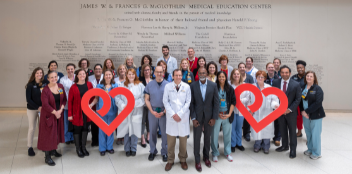Is food the best medicine for heart failure?
Researchers definitively link diet and heart health
Despite our satisfaction from polishing off a hearty breakfast or fast-food lunch, our hearts may beg to differ, statistically speaking. Preclinical and clinical studies at Pauley confirm what we’ve known for years: A diet high in refined sugars and saturated fats will likely catch up with our heart health.
Researchers looked at the effects of a diet rich in sugars and saturated fats, known as a Western diet, starting with a study published in 2015. “We were most interested in cardiac function — to see how the heart is affected by eating an unhealthy diet,” said principal investigator Dr. Salvatore Carbone, assistant professor in the Department of Kinesiology and Health Sciences, College of Humanities and Sciences at VCU. Carbone, a native of Italy, sought to determine if a diet rich in foods containing healthy fats, such as extra-virgin olive oil and tree nuts, that resembled the Mediterranean dietary pattern, could improve body composition, cardiac function and, ultimately, exercise capacity in people who were obese and had a specific form of heart failure called heart failure with preserved ejection fraction.

Also known as HFpEF, heart failure with preserved ejection fraction occurs when the heart pumps blood and contracts relatively normally, but is too stiff to fill and relax properly. About 6.5 million adults in the U.S. have heart failure, according to the Centers for Disease Control and Prevention, and about half of those people present with HFpEF. In the U.S., more than 80% of people who have HFpEF are overweight or obese. Importantly, to date, there are no drugs approved by the Food and Drug Administration to improve clinical outcomes in HFpEF, clearly highlighting the need to develop novel efficacious therapies.
Carbone launched a preclinical study in 2014. In a laboratory, he fed mice a high-sugar and high-saturated fat diet. Within eight weeks, the mice developed cardiac dysfunction and became obese. Importantly, when the mice were switched to a healthy diet with lower calories, the cardiac function returned to the baseline values, showing that the cardiac dysfunction induced by unhealthy diet is reversible, “suggesting there is hope — if you change your diet and your lifestyle.”
Carbone and his colleagues also wanted to know whether, independent of caloric intake, improving the quality of the diet could prevent the cardiac dysfunction.
In a follow-up study, the Western diet was modified. Unsaturated (read: “healthy”) fats were substituted for the saturated fats typically found in the Western diet.
After being on the “high-healthy fat” diet for eight weeks, which is equal to several years in humans, Carbone said, cardiac function was preserved and mice did not become obese, despite consuming the same amount of calories.”
After conducting the second round of preclinical research and observational study (i.e., without interventions) in patients with obesity and HFpEF, Carbone felt ready to launch a feasibility study to ensure that people would comply with a prescribed diet of increased unsaturated fatty acids. With pilot funding from Pauley and the VCU School of Medicine Department of Internal Medicine, he and his research team enrolled nine VCU Health patients in a 12-week dietary intervention aimed at having participants consume a recommended daily amount of foods rich in unsaturated fatty acids.
The results of the study, published last fall, demonstrated for the first time in scientific history that a dietary intervention aimed at increasing unsaturated fatty acid consumption was feasible and had the potential to improve cardiorespiratory fitness in people with severe obesity and HFpEF.
“Larger randomized controlled trials to test the efficacy of unsaturated fatty acids supplementation on cardiorespiratory fitness (i.e., exercise capacity) and clinical outcomes, as well as understanding the mechanisms through which unsaturated fatty acids may exert these beneficial effects are clearly warranted,” Carbone said in the journal article.
Back to Spring-2020

